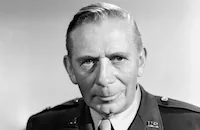The Eve of St. Mark
Cast & Crew
John M. Stahl
Anne Baxter
William Eythe
Michael O'shea
Vincent Price
Ruth Nelson
Film Details
Technical Specs

Synopsis
Pvt. Quizz West, who was drafted on 29 Oct 1940, along with a million and a half other young men, is on leave from basic training when he returns to his boyhood home in Ithaca, New York, where his family eagerly awaits his arrival and the fulfillment of his promise to introduce them to "the most wonderful person in the world." Quizz's father and mother, Deckman and Nell, and his younger brothers, Zip and Neil, laugh when Quizz shows up with Janet Feller, the daughter of the local postman. Although Janet has loved Quizz for years, he had not noticed his pretty neighbor until they met in New York City while he was on leave. Quizz then shows Janet the spot where he intends to build a home and asks her to share it with him, and Janet gladly accepts. After Quizz returns to Camp Grace, the soldiers count their money on payday, and several of Quizz's comrades--Pvt. Thomas Mulveroy, Corp. Tate, Pvt. Glinka and Shevlin--divide up the pay packet of Pvt. Francis Marion, a philosophical, alcohol-loving Southerner who continually borrows money from them. Glinka then relates part of a morale lecture he overheard, which is being attended by Ruby, their profanity-spewing drill sergeant. According to Glinka, the non-commissioned officers were told that fifteen percent of the men will behave themselves because of their love for their wives or sweethearts, another twenty-five percent will commit mischief and cannot be redeemed, and that the remaining sixty percent, who may go either way, must be offered something better in order to keep them on the straight and narrow. Mulveroy then does an insulting impersonation of Ruby, whom all the men despise, just as the sergeant enters. Ruby threatens to make life difficult for the men, and in retaliation, they plot to beat Ruby and Sgt. Kriven to town, where the officers are supposed to meet twin sisters Sal and Lill Bird. At a cheap night spot, Mulveroy and Glinka attempt to romance Sal and Lill, but the sisters are more impressed by the quiet Quizz and poetical Marion. Although Sal realizes that Quizz is in love with a girl back home, she tells him that he will forget her, as she is so far away. Quizz remains true to Janet, however, and leaves with Marion to mail a letter to her. Later, the company receives orders to ship out for San Francisco, but are first given a forty-eight hour leave to say their goodbyes. Quizz spends most of his leave trying to get home, but once there, he and Janet affirm their love for each other. The men then depart for San Francisco and the South Pacific, and months later, Janet reads one of Quizz's letters aloud to the West family. The family is thunderstruck by the announcement of the bombing of Pearl Harbor, and anxiously realize that Quizz may not come home. Later, Quizz and the others are fighting a desperate battle to hold their tiny, strategically important island in the Philippines. Low on rations and quinine, the men are plagued by malaria and exhaustion but continue to fight. The feverish Marion, upon asking the date, remarks that it is the Eve of St. Mark, when, according to legend, a maiden standing in a church doorway can see all those who are going to die within the year. Just then, Marion notices Pepita, a Filipino woman who has been acting as the men's nurse, standing at the entrance of their cave, and he interprets her presence as proof that they will all die. Kriven, who has gone to another island for orders, returns with a letter from their commanding officer, who tells the men that, while they are free to retreat, every day they hold back the encroaching Japanese forces will aid the other troops. The men decide to sleep on the situation before voting whether to remain or leave, and as Quizz tosses and turns, he dreams of Janet and his mother, who both urge him to return. The next day, the men vote to stay, and as they pound at nearby Japanese barges with their Howitzer, the island is hit. Later, in Ithaca, the Wests listen to a radio report offering comfort to families with sons missing in action, and Janet arrives with a letter from Quizz's commanding officer, Solway. Solway has forwarded Quizz's last letters to Janet and tells her that Quizz and his friends, who acted with extraordinary courage, were shelled, but that some of them escaped in an outrigger. Solway encourages Janet, telling her that she may hear from Quizz in time, and Deck and Nell prepare to send their other sons off to join the military.

Director

John M. Stahl
Cast

Anne Baxter

William Eythe

Michael O'shea

Vincent Price
Ruth Nelson

Ray Collins
Stanley Prager

Henry Morgan
Robert Bailey
Joann Dolan
Toni Favor
George Mathews

John Archer
Murray Alper

Dickie Moore
Joven E. Rola
Harry Shannon
Roger Clark
Jimmy Clark
B. S. Pully
Harry Carter
Harry Strang
Rod Bacon
Michael Owen

Blake Edwards
John Whitney
Milt Kibbee
Matt Mchugh

Buddy Yarus
Skipper, A Dog
Martin Black
Reed Hadley
Crew
James Basevi
Col. Phillip W. Booker
Bonnie Cashin
Eugene Grossman
Frank E. Hughes
F. E. Johnston
Joseph La Shelle
Harry M. Leonard
Thomas Little
Cyril J. Mockridge
Emil Newman
Guy Pearce
William Perlberg
Irving Pichel
Louis Sackin
George Seaton
Fred Sersen
Russell Spencer
Frank Weatherwax

Film Details
Technical Specs

Quotes
Trivia
Notes
According to a November 16, 1942 Hollywood Reporter news item, Warner Bros., Paramount, M-G-M and Twentieth Century-Fox had each offered to meet Maxwell Anderson's asking price of $300,000 for the screen rights to his successful Broadway play before he selected Twentieth Century-Fox. Included in the purchase was an agreement not to release the film before January 1944, in order to give the play time to finish its run. Cast members Michael O'Shea, Stanley Prager, Joann Dolan, Toni Favor, George Mathews and Joven E. Rola reprised their roles from the Broadway production of the play.
In June 1943, Hollywood Reporter announced that Dana Andrews, James Engler and Brian Donlevy were being considered for top spots in the picture, and that "after making exhaustive tests for the femme lead," the studio handed the role to Dorothy McGuire. In July 1943, Hollywood Reporter noted that Charles Bickford had been cast as "Deckman West," and in August 1943, that Maureen O'Hara would play "Janet Feller," as McGuire was not available for loanout from David O. Selznick for the role. Another August 1943 Hollywood Reporter item stated that Aline MacMahon would be reprising her Broadway role of "Nell West" for the film. According to studio publicity statements, Tony Hughes was to play the chaplain, although that part is played by Harry Shannon in the finished film, and Leland Gray was cast as a soldier. Gray's appearance in the completed picture has not been confirmed, however. Ray Collins was borrowed from M-G-M for the production, which marked the screen debut of Stanley Prager. Michael O'Shea, who had been billed as Eddie O'Shea on Broadway, received such good notices for The Eve of St. Mark, according to a Hollywood Reporter news item, that Twentieth Century-Fox signed him to a long-term contract, which was shared with Hunt Stromberg.
According to information in the file on the film in the MPAA/PCA Collection at the AMPAS Library, the film had numerous censorship problems, which began in 1942 when Paramount and M-G-M asked the PCA for approval to adapt the play. PCA director Joseph I. Breen strongly advised against the purchase, stating that a film based on the material could never be approved. Breen cited as problematic the scene in which the percentage of soldiers who will be sexually active is discussed; the characterization of "Lill" and "Sal" as prostitutes; the sequence in which "Quizz," while at home before being shipped out, and "Janet" contemplate consumating their relationship before they are married; and the "blasphemous language which occurs throughout the story." The June 9, 1943 first draft continuity submitted to the PCA by Twentieth Century-Fox was rejected by Breen due to the "percentage" concept relating to sexual activity, the men's interactions with "Lill" and "Sal," and the discussion between "Quizz" and "Janet" about the morality of becoming lovers before he leaves for combat duty. Breen also objected to "Janet" and "Nell" telling "Quizz" in the dream sequence to come home so that he can fulfill his relationship with "Janet." To make the screenplay acceptable, Breen suggested that the studio make it clear that the "percentage" scene referred to soldiers becoming drunk and disorderly. Although the studio did insert the suggested dialogue for that scene, as well as dropping the controversial discussion between "Janet" and "Quizz," numerous other dialogue bits objected to by the PCA were kept in the finished film, including "Ruby's" frequent use of the word "rutting"; "Mulveroy's" line, "With me, they got to have shoes!" when referring to his sexual preferences; and much of the suggestive dialogue in the sequences with "Lill" and "Sal."
Although the picture received generally favorable reviews, several reviewers criticized the ending, in which it is definitely implied that "Quizz" is still alive. The New York Herald Tribune reviewer commented, "There are those, undoubtedly, who will question the propriety of changing the ending....[that] found a farmboy dying on a South Sea atoll shortly after Pearl Harbor as 'one of the first to go, one of the first to die that we May keep this earth for free men.' Anderson was writing of his nephew, Sergeant Lee Chambers, and dedicated the play to him." According to the Los Angeles Times critic, "the prophecy contained in the title is never fulfilled. This prophecy, a 'vision' of death on St. Mark's Eve, was originally shot as written and then changed when preview spectators complained of the 'unhappy ending.' As a consequence, Anderson's whole point is blunted and his title rendered meaningless." Early scripts contained in the studio files indicate that Twentieth Century-Fox did originally intend to preserve Anderson's ending. The Variety reviewer, however, asserted that the change had its "compensations," noting, "If 20th-Fox's purpose was to give hope to friends and relatives of Philippine defenders 'missing in action'-and there's little question that such was its intent-then it's a commendable token of how Hollywood has done much in this war to promote the morale of the American civilian."
According to the obituary of writer Marion Hargrove (1919-2003), Anderson based the character of "Pvt. Francis Marion" on him. Among Hargrove's many books was the comic novel See Here, Private Hargrove, upon which a 1944 M-G-M picture of the same title was produced (see below).












